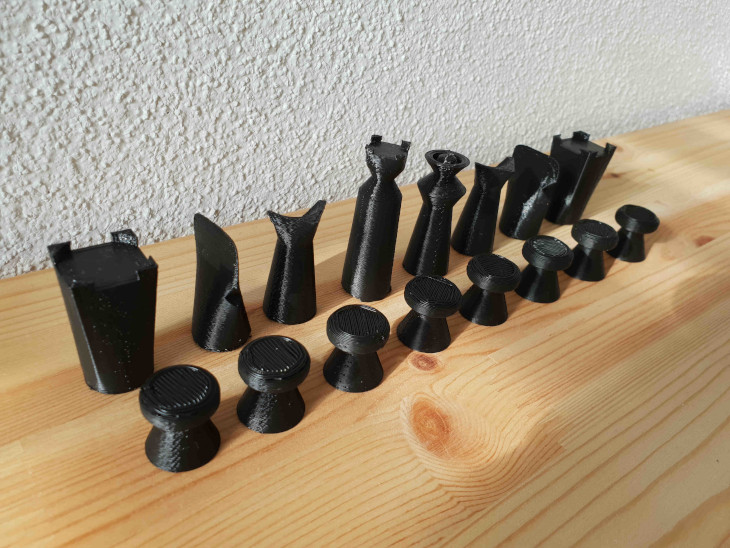Cadquery Chess Set

A weird project to test my new 3d printer: A chess set designed in cadquery.
Note from the future: This coding style is grossly outdated and kept here only as archive of the past. Cadquery changed a lot over the years. Nowadays we have assemblies support, for instance.
# Chess set
import cadquery as cq
# Chess board squares size
cbss = 25
right_side_up_pawns = True # False is probably better for 3d printing
# king base diameter and height
kb = cbss*0.75
kh = kb*2.5
king = cq.Workplane("front").circle(kb/2).workplane(offset=kh*0.7).circle(kb*0.8/2).loft(combine=True).\
faces(">Z").workplane().circle(kb*0.8/2).workplane(offset=kh*0.1).circle(kb*0.4/2).loft(combine=True).\
faces(">Z").workplane().circle(kb*0.4/2).workplane(offset=kh*0.08).circle(kb*0.7/2).loft(combine=True).\
faces(">Z").workplane().circle(kb*0.7/2).workplane(offset=kh*0.12).polygon(4, kb).loft(combine=True).\
faces(">Z").hole(kb*0.75,kh*0.03).translate((0,cbss*3,0))
queen = cq.Workplane("front").circle(kb/2).workplane(offset=kh*0.5).circle(kb*0.6/2).loft(combine=True). \
faces(">Z").workplane().circle(kb*0.6/2).workplane(offset=kh*0.12).circle(kb/2).loft(combine=True). \
faces(">Z").workplane().circle(kb/2).workplane(offset=kh*0.1).circle(kb*0.4/2).loft(combine=True). \
faces(">Z").workplane().circle(kb*0.4/2).workplane(offset=kh*0.1).circle(kb*0.9/2).loft(combine=True). \
faces(">Z").hole(kb*0.6,kh*0.03) .\
faces(">Z[-2]").workplane().circle(kb*0.4/2).extrude(kh*0.05) .\
faces(">Z").fillet(kh*0.05-0.1).translate((0,cbss*4,0))
def rook():
rk = cq.Workplane("front").circle(kb/2).workplane(offset=kh*0.7).polygon(4, kb*1.6).loft(combine=True). \
faces(">Z").hole(kb*1.2,kh*0.05)
return rk
def knight():
mouth = cq.Workplane("top").polygon(4, kb*0.8).extrude(kb*2).translate((kb*0.75,-kb,kb*1.3))
kn = cq.Workplane("front").circle(kb/2).workplane(offset=kh*0.7).center(-kb*0.1,0).polygon(2, kb*1.5).loft(combine=True)
kn = kn.cut(mouth)
return kn
def bishop():
hat = cq.Workplane("front").circle(kb*0.6/2).workplane(offset=kh*0.2).polygon(4,kb*1.2).loft(combine=True). \
faces(">Z").center(-kb*0.2,0).cskHole(kb*0.4,kb,72).translate((0,0,kh*0.5))
bi = cq.Workplane("front").circle(kb/2).workplane(offset=kh*0.5).circle(kb*0.6/2).loft(combine=True)
bi = bi.add(hat).combine()
return bi
def pawn():
pa = cq.Workplane("front").circle(kb/2).extrude(kh*0.1) .\
faces(">Z").workplane().circle(kb*0.4/2).workplane(offset=kh*0.25).circle(kb/2).loft(combine=True) .\
edges("not>Z").fillet(kb*0.1)
if right_side_up_pawns:
pa = pa.rotate((0,0,0), (1,0,0),180).translate((0,0,kh*0.35))
return pa
Lrook = rook()
Rrook = rook().translate((0, cbss*7, 0))
Lknight = knight().translate((0, cbss, 0))
Rknight = knight().translate((0, cbss*6, 0))
Lbishop = bishop().translate((0, cbss*2, 0))
Rbishop = bishop().translate((0, cbss*5, 0))
Lrook_pawn = pawn().translate((cbss, 0, 0))
Lknight_pawn = pawn().translate((cbss, cbss, 0))
Lbishop_pawn = pawn().translate((cbss, cbss*2, 0))
king_pawn = pawn().translate((cbss, cbss*3, 0))
queen_pawn = pawn().translate((cbss, cbss*4, 0))
Rbishop_pawn = pawn().translate((cbss, cbss*5, 0))
Rknight_pawn = pawn().translate((cbss, cbss*6, 0))
Rrook_pawn = pawn().translate((cbss, cbss*7, 0))
chess_set = king.add(queen).add(Lrook).add(Rrook).add(Lknight).add(Rknight) .\
add(Lbishop).add(Rbishop).add(Lrook_pawn).add(Lknight_pawn) .\
add(Lbishop_pawn).add(king_pawn).add(queen_pawn).add(Rbishop_pawn) .\
add(Rknight_pawn).add(Rrook_pawn).combine()
#show
#show_object(Lrook, options={"rgba":(204, 204, 204, 0.0)})
#show_object(Lknight, options={"rgba":(204, 204, 204, 0.0)})
#show_object(Lbishop, options={"rgba":(204, 204, 204, 0.0)})
#show_object(queen, options={"rgba":(204, 204, 204, 0.0)})
#show_object(king, options={"rgba":(204, 204, 204, 0.0)})
#show_object(Rbishop, options={"rgba":(204, 204, 204, 0.0)})
#show_object(Rknight, options={"rgba":(204, 204, 204, 0.0)})
#show_object(Rrook, options={"rgba":(204, 204, 204, 0.0)})
#show_object(Lrook_pawn, options={"rgba":(204, 204, 204, 0.0)})
#show_object(Lknight_pawn, options={"rgba":(204, 204, 204, 0.0)})
#show_object(Lbishop_pawn, options={"rgba":(204, 204, 204, 0.0)})
#show_object(king_pawn, options={"rgba":(204, 204, 204, 0.0)})
#show_object(queen_pawn, options={"rgba":(204, 204, 204, 0.0)})
#show_object(Rbishop_pawn, options={"rgba":(204, 204, 204, 0.0)})
#show_object(Rknight_pawn, options={"rgba":(204, 204, 204, 0.0)})
#show_object(Rrook_pawn, options={"rgba":(204, 204, 204, 0.0)})
show_object(chess_set, options={"rgba":(130, 185, 255, 0.0)})
Some final comments about the script: I read an article here to more or less have some guidance about the parameters. The diameter of the bottom of the pieces should be 75% of the playing square and the height should be 2.5 x that number. They call this the 75% guideline.
It’s a bit unusual object to draw using parametric CAD and probably easier with point and click softwares but it was an interesting parametric exercise. I had a lot of fun coding the pieces and printing them.

Thanks for looking
Edi